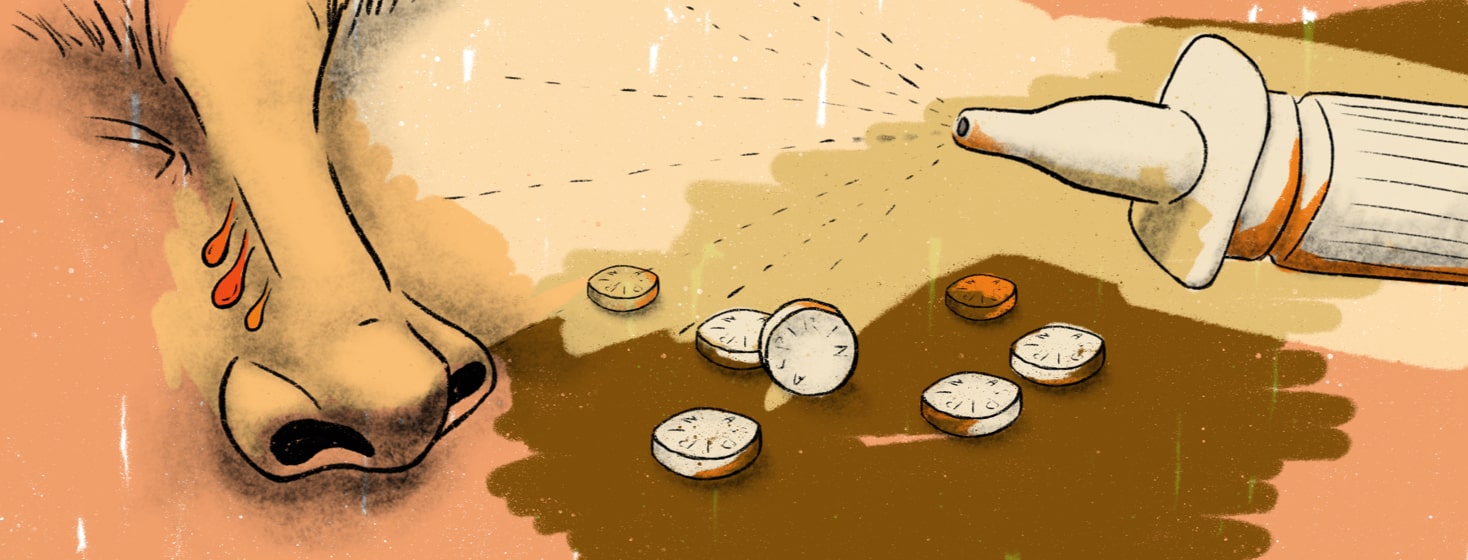What Is the Asthma Triad (Samter’s Triad)?
The asthma triad is also called Samter’s triad or aspirin-exacerbated respiratory disease (AERD). It consists of 3 conditions that happen together:1
- Sinus inflammation with nasal polyps
- Asthma
- Aspirin sensitivity
Symptoms start during late childhood or young adulthood. People may experience a delay in diagnosis of about 10 years after symptoms begin. This happens because aspirin sensitivity does not appear until years after other symptoms.1
What are symptoms of each condition of Samter’s Triad?
The 3 conditions of Samter's Triad have distinct symptoms.
Sinus inflammation with nasal polyps
Nasal polyps are painless growths on the lining of your nose or sinuses. They are caused by chronic inflammation or repeated infections. Small nasal polyps may not cause symptoms. Larger growths can block your nasal passage and lead to problems.2
Some common symptoms of nasal polyps include:1,2
- Stuffy nose
- Runny nose
- Postnasal drip
- Low sense of smell (hyposmia) or no sense of smell (anosmia)
- Low sense of taste
- Headache
- Frequent nosebleeds
Nasal congestion and rhinorrhea usually appear first. Hyposmia then develops later, which is a sign of sinus inflammation with nasal polyps.1
Asthma
Symptoms of asthma appear about 2 years after the first respiratory symptoms. Symptoms vary for each person. For example, some people experience infrequent asthma attacks. Others experience symptoms at certain times or have symptoms all the time.1
Possible symptoms of asthma include:3
- Shortness of breath
- Chest tightness or pain
- Wheezing when breathing out
- Trouble sleeping caused by shortness of breath
Aspirin sensitivity
People with Samter’s triad have bad reactions to aspirin and other nonsteroidal anti-inflammatory drugs (NSAIDs) like ibuprofen. These reactions start about 4 years after asthma symptoms start. Symptoms start within a few hours of taking aspirin and include:1,4
- Coughing
- Wheezing
- Chest pain
- Eye watering or redness
- Rash
- Nausea
- Stomach cramping or pain
Avoid taking aspirin and other NSAIDs if you notice this sensitivity. Acetaminophen (Tylenol) and celecoxib (Celebrex) may be safer options. However, symptoms may continue even if you avoid aspirin.5
What is the difference between Samter’s triad and bronchial asthma?
Asthma types vary by age of onset and certain triggers. Bronchial asthma is the most common type. This happens when asthma affects the air passages in the lungs (bronchi). Certain triggers can worsen asthma, such as allergies, irritants, and exercise.3
Less than 10 percent of people with asthma have Samter’s triad. The unique features of Samter’s triad are nasal polyps and aspirin-induced asthma. It often develops during young adulthood and is more severe than other types of asthma.1,4
How is Samter's Triad treated?
While there is no cure for Samter's triad, there are several treatment options available. A combination of treatments is often most effective.
Corticosteroids
Corticosteroids can treat different parts of Samter’s triad. For example, you may use:1,6
- Nasal sprays to treat nasal polyps
- Inhaled steroids to control asthma
- Oral steroids to reduce asthma symptoms
Nasal corticosteroids (such as fluticasone) can reduce inflammation in the nasal passage. This can improve sense of smell and reduce nasal polyps. Oral steroids like prednisone provide quick relief of symptoms. Long-term use can cause serious side effects.1,2
Aspirin desensitization
Aspirin desensitization helps your body tolerate aspirin. The treatment involves slowly increasing your dose of aspirin. Once you can take a full dose without experiencing symptoms, you are “desensitized.” You can then continue to take aspirin safely. You will need to take aspirin daily to stay desensitized. This process takes 2 to 4 days and must be supervised by an experienced doctor.1,4,5
Studies have shown that aspirin desensitization:1
- Improves sense of smell
- Reduces nasal congestion
- Reduces nasal polyp growth after surgery
- Reduces the need for corticosteroids
- Decreases the frequency of surgeries
Medicines
Your doctor may suggest medicines to treat asthma or nasal polyps. Some work by blocking pro-inflammatory chemicals in the body called leukotrienes. Two examples of “leukotriene modifiers” are montelukast (Singulair) and zileuton (Zyflo).1,4
Other medicines work in different ways to treat respiratory symptoms in asthma. These may benefit people with Samter’s triad. These include:1,4
- Mepolizumab (Nucala)
- Omalizumab (Xolair)
- Dupilumab (Dupixent)
Endoscopic sinus surgery
If other treatments do not remove nasal polyps, you may need endoscopic sinus surgery (ESS). This procedure removes polyps and corrects problems that cause polyps. In ESS, doctors use a tiny camera and instruments to remove polyps. They may also widen sinuses openings into the nasal passage.1,2
The procedure does not prevent new nasal polyps. Doctors will suggest therapies after the surgery to prevent polyps from returning. This may include corticosteroid nasal sprays, aspirin desensitization, and other drugs.1
Dietary changes
Dietary changes may improve symptoms for people with Samter’s triad. A diet higher in omega-3 fatty acids and lower in omega-6 fatty acids may reduce inflammation. It may also help to eliminate foods with salicylic acid, such as certain fruits and vegetables. Reducing alcohol intake can also improve symptoms. Talk to your doctor before making changes to your diet.1,7

Join the conversation